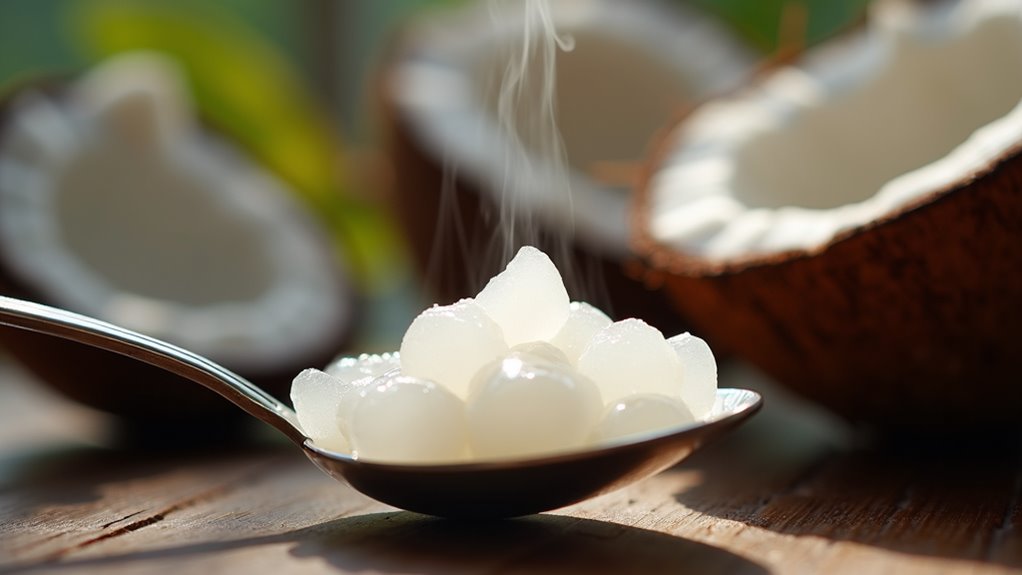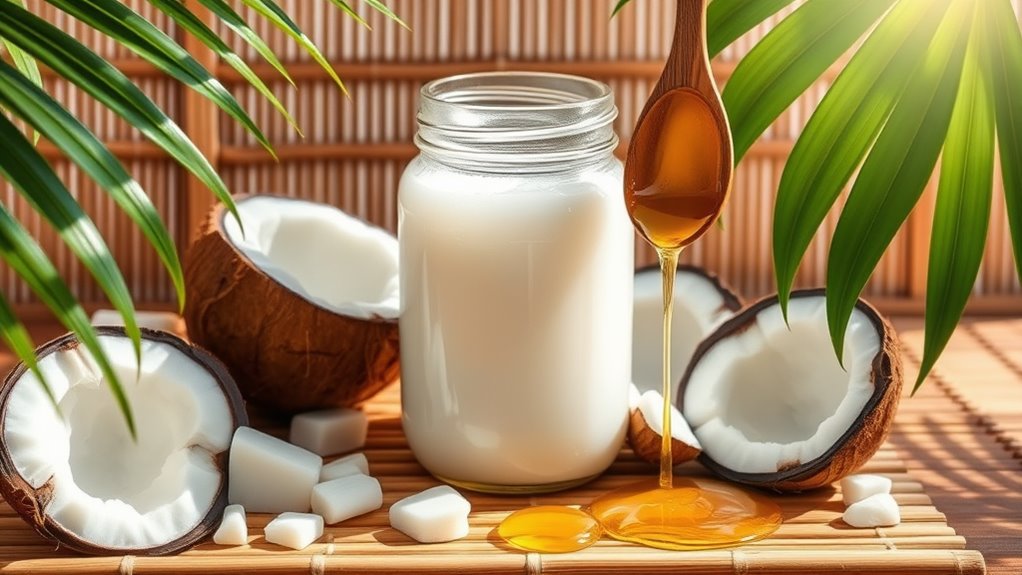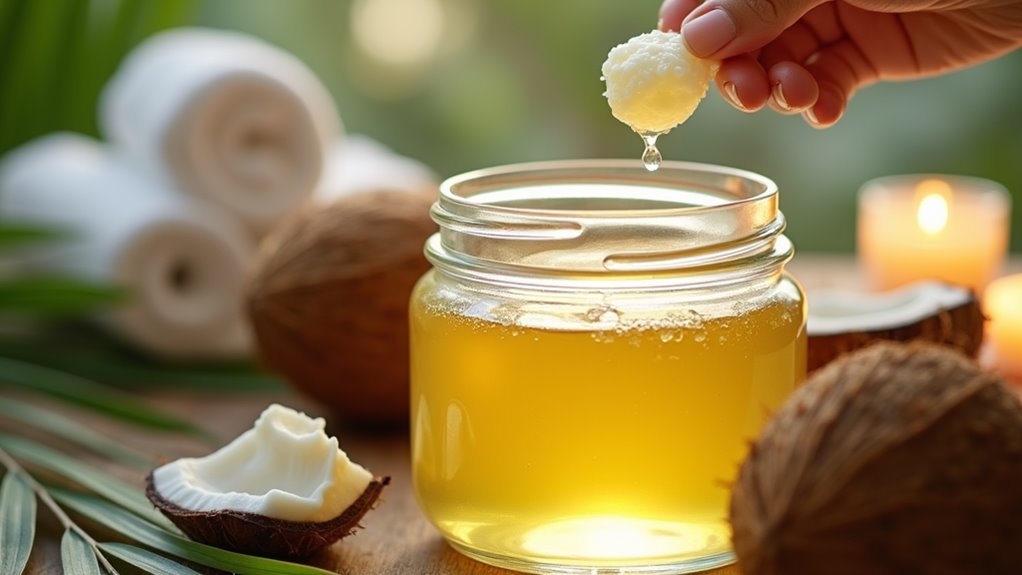A Spoonful a Day- Coconut Oil Benefits You Never Knew
You’ll transform your health with just one daily spoonful of coconut oil through its unique combination of medium-chain triglycerides (MCTs) and lauric acid. Your body rapidly converts MCTs into energy while lauric acid fights harmful pathogens. This powerful oil enhances heart health, boosts brain function, strengthens immunity, and promotes healthy skin and hair. The science behind coconut oil’s therapeutic properties reveals even more surprising benefits.
The Science Behind Coconut Oil’s Powerful Properties
Coconut oil’s remarkable properties stem from its unique molecular composition of medium-chain triglycerides (MCTs) and lauric acid.
These MCTs are metabolized differently than other fats, traveling directly to your liver where they’re quickly converted into energy rather than stored as fat.
The high concentration of lauric acid, which makes up about 50% of coconut oil’s fatty acids, provides antimicrobial properties.
When your body processes lauric acid, it creates monolaurin, a compound that can help fight harmful pathogens.
Among various coconut oil uses, this antimicrobial action makes it effective for both internal consumption and topical applications.
Regular consumption can support cognitive function enhancement in aging pets while providing natural energy.
Heart Health and MCT Benefits
Although initially controversial, research now suggests that the MCTs in coconut oil can support cardiovascular health through multiple mechanisms.
The medium-chain triglycerides enhance your body’s ability to burn fat, potentially reducing harmful visceral fat accumulation around organs. You’ll find that MCTs can help maintain healthy cholesterol ratios by increasing HDL (good) cholesterol while having minimal impact on LDL levels.
Studies indicate that coconut oil’s lauric acid content may help prevent arterial plaque formation and reduce inflammation markers linked to heart disease.
Additionally, MCTs can improve insulin sensitivity and blood sugar regulation, factors closely tied to cardiovascular well-being.
The small molecular size of coconut oil allows it to penetrate deeply into cells, enhancing its therapeutic effects throughout the body.
Natural Beauty and Skincare Applications
You’ll find coconut oil to be a versatile natural moisturizer for both face and body care, as its molecular structure allows it to penetrate deep into the skin’s layers.
Its rich content of medium-chain fatty acids and antioxidants helps protect your skin barrier while reducing inflammation and supporting natural collagen production.
When applied to hair, coconut oil’s lauric acid content can strengthen hair shafts, prevent protein loss, and reduce damage from UV exposure and chemical treatments.
For best results, create a growth-boosting blend by mixing coconut oil with rosemary and peppermint essential oils to enhance your hair care routine.
Face and Body Moisturizer
As a natural moisturizer, coconut oil effectively hydrates and nourishes both facial and body skin due to its medium-chain fatty acids, particularly lauric acid. You’ll find it penetrates deeply into skin layers, providing lasting moisture without clogging pores. Research shows its antimicrobial properties help prevent skin infections while promoting collagen production.
| Skin Benefit | Scientific Action | Result |
|---|---|---|
| Hydration | Lipid barrier restoration | Plump, supple skin |
| Protection | Antimicrobial defense | Reduced infections |
| Healing | Collagen synthesis | Improved elasticity |
Apply a thin layer to damp skin for optimal absorption. The oil’s antioxidant properties combat free radicals, reducing signs of aging and environmental damage.
Natural Hair Treatment
Three key nutrients in coconut oil – lauric acid, capric acid, and vitamins E and K – make it an excellent natural hair treatment for damaged, dry, or frizzy hair.
These compounds penetrate the hair shaft, reducing protein loss and preventing breakage. You can use coconut oil as a pre-shampoo treatment or leave-in conditioner.
Apply it directly to your scalp to combat dandruff and promote healthy follicle growth. Research shows that coconut oil’s antimicrobial properties help fight scalp infections while its moisturizing effects reduce split ends and improve hair elasticity.
For best results, warm the oil slightly before massaging it into your hair and scalp.
Boosting Brain Function and Mental Clarity
While other types of fats have earned a bad reputation, coconut oil’s unique medium-chain triglycerides (MCTs) can enhance cognitive function and support overall brain health.
Your brain cells convert MCTs into ketones, providing an alternative energy source that’s more efficient than glucose. Research suggests these ketones may improve memory, reduce inflammation, and protect against neurodegenerative conditions like Alzheimer’s disease.
Studies have shown that the MCTs in coconut oil can cross the blood-brain barrier directly, delivering essential nutrients and potentially reducing brain fog.
You’ll find that regular consumption may enhance mental clarity, focus, and cognitive performance throughout the day.
Athletes often consume 1-2 tablespoons before workouts to maintain optimal mental focus and steady energy levels.
Antimicrobial and Immune System Support
Coconut oil’s benefits extend far beyond brain health into the realm of immune support and antimicrobial protection.
Its high concentration of lauric acid, which converts to monolaurin in your body, helps fight harmful pathogens, including bacteria, viruses, and fungi.
You’ll find that about 50% of coconut oil’s fatty acids consist of lauric acid, making it nature’s richest source of this powerful compound.
Research shows that coconut oil’s medium-chain fatty acids can help eliminate harmful bacteria like Staphylococcus aureus and Streptococcus species.
These antimicrobial properties also support your body’s natural immune response by strengthening barrier functions and reducing inflammation.
When used for oil pulling therapy, coconut oil can combat oral bacteria while promoting fresher breath and improved gum health.
Weight Management and Metabolism Effects
Coconut oil’s medium-chain triglycerides (MCTs) can boost your metabolism by increasing calorie burn and fat oxidation during digestion.
Your body processes MCTs differently than other fats, sending them directly to the liver where they’re quickly converted into energy rather than stored as fat.
MCTs may help you feel fuller longer by influencing hunger hormones and reducing overall caloric intake throughout the day.
Just like with dogs, virgin coconut oil provides quick energy and supports optimal metabolic function when taken daily.
Fat-Burning Properties Explained
Although medium-chain triglycerides (MCTs) comprise nearly 60% of coconut oil’s fat content, it’s their unique molecular structure that enables faster metabolic processing compared to long-chain fatty acids.
Your body converts MCTs directly into energy through these mechanisms:
- MCTs bypass normal fat digestion and go straight to your liver
- They increase thermogenesis, raising your metabolic rate by up to 5%
- Your cells utilize MCTs for energy instead of storing them as fat
- MCTs enhance ketone production, supporting fat oxidation even without a ketogenic diet
These properties make coconut oil a valuable tool for optimizing your body’s fat-burning potential.
Appetite Control Through MCTs
While many foods can affect satiety, MCTs found in coconut oil demonstrate unique appetite-suppressing effects through multiple pathways.
When you consume MCTs, they’re rapidly absorbed and transported directly to your liver, where they boost ketone production. These ketones help reduce ghrelin, your hunger hormone, while increasing peptide YY and leptin, your satiety hormones.
Studies show that you’ll feel fuller for longer after consuming MCTs compared to longer-chain fatty acids. This appetite-suppressing effect can lead to reduced caloric intake throughout the day, making coconut oil a valuable tool for weight management strategies.
Oral Health and Oil Pulling Benefits
Studies show that oil pulling with coconut oil can significantly improve oral health by reducing harmful bacteria and fighting tooth decay. The antimicrobial properties of lauric acid, found abundantly in coconut oil, make it particularly effective for maintaining oral hygiene.
-
Swishing coconut oil for 15-20 minutes eliminates Streptococcus mutans, a primary cause of dental cavities.
-
Regular oil pulling reduces plaque formation by 50-60%.
-
The practice decreases gingivitis symptoms and inflammation.
-
Coconut oil’s medium-chain fatty acids penetrate biofilm barriers to destroy harmful microorganisms.
Scientific research confirms traditional oil pulling methods enhance overall dental health when combined with regular brushing and flossing. For optimal results, use organic cold-pressed oil warmed to room temperature before beginning your morning routine.
Hair Care and Scalp Treatment Uses
Because of its rich nutrient profile and molecular structure, coconut oil penetrates hair shafts more effectively than other natural oils.
Its lauric acid content helps prevent protein loss in damaged and undamaged hair strands, while its antimicrobial properties combat scalp infections and dandruff.
You’ll find coconut oil particularly beneficial for treating dry, brittle hair and split ends.
When applied to your scalp, it can reduce inflammation, improve blood circulation, and stimulate hair follicles for healthier growth.
For best results, massage warm coconut oil into your scalp and hair, leave it on for 30 minutes to overnight, then shampoo as usual.
Regular treatments containing tea tree oil can help eliminate persistent dandruff while nourishing your scalp.
Digestive Health and Gut Support
Your gut health can significantly improve with coconut oil’s natural antimicrobial properties, which effectively target and eliminate harmful bacteria while preserving beneficial flora.
Studies show that coconut oil’s medium-chain triglycerides (MCTs) help reduce intestinal inflammation and support the healing of digestive tract tissues.
These MCTs also enhance your body’s ability to absorb essential nutrients by improving the function of your intestinal cell membranes and promoting better nutrient transport.
Kills Harmful Gut Bacteria
The medium-chain fatty acids in coconut oil possess powerful antimicrobial properties that can help eliminate harmful bacteria, fungi, and parasites from your digestive tract.
Research has shown that coconut oil’s antimicrobial effects target specific pathogens while preserving beneficial gut flora.
Here’s how it works:
- Lauric acid disrupts bacterial cell membranes, causing them to break down.
- Caprylic acid effectively combats Candida albicans overgrowth.
- Capric acid neutralizes harmful Staphylococcus bacteria.
- MCTs reduce inflammation associated with bacterial infections.
Reduces Inflammation Naturally
When consumed regularly, coconut oil’s unique medium-chain triglycerides work to reduce chronic inflammation throughout your digestive system by suppressing pro-inflammatory compounds and supporting healthy gut barrier function.
Research shows that coconut oil’s lauric acid and caprylic acid components help decrease inflammatory markers like cytokines and interleukins.
These fatty acids also enhance your body’s antioxidant defenses by activating anti-inflammatory pathways.
You’ll benefit most from taking 1-2 tablespoons daily, as studies indicate this amount effectively lowers systemic inflammation while promoting balanced immune responses in your gut microbiome.
Improves Nutrient Absorption
Medium-chain fatty acids found in coconut oil significantly enhance your body’s absorption of fat-soluble vitamins A, D, E, and K, along with essential minerals like calcium and magnesium.
This improved nutrient absorption occurs through multiple mechanisms that support your digestive health.
- Stimulates the secretion of digestive enzymes to break down nutrients more efficiently
- Creates an alkaline environment in your gut that optimizes mineral absorption
- Strengthens intestinal cell membranes, improving their ability to transport nutrients
- Enhances the bioavailability of amino acids and B-vitamins by supporting beneficial gut bacteria
Your body’s ability to utilize these essential nutrients directly impacts your immune function, bone health, and cellular repair processes.
Sports Performance and Energy Enhancement
Although endurance athletes have long relied on carbohydrates for fuel, coconut oil’s unique fatty acid profile makes it an excellent energy source during prolonged physical activity.
The medium-chain triglycerides (MCTs) in coconut oil bypass normal fat digestion and head straight to your liver, where they’re quickly converted into ketones for immediate energy use.
You’ll find that coconut oil can enhance athletic performance by providing sustained energy without blood sugar spikes.
Research shows it may also increase metabolism and fat burning during exercise. When you consume coconut oil before workouts, it can help reduce muscle fatigue and improve endurance capacity.







